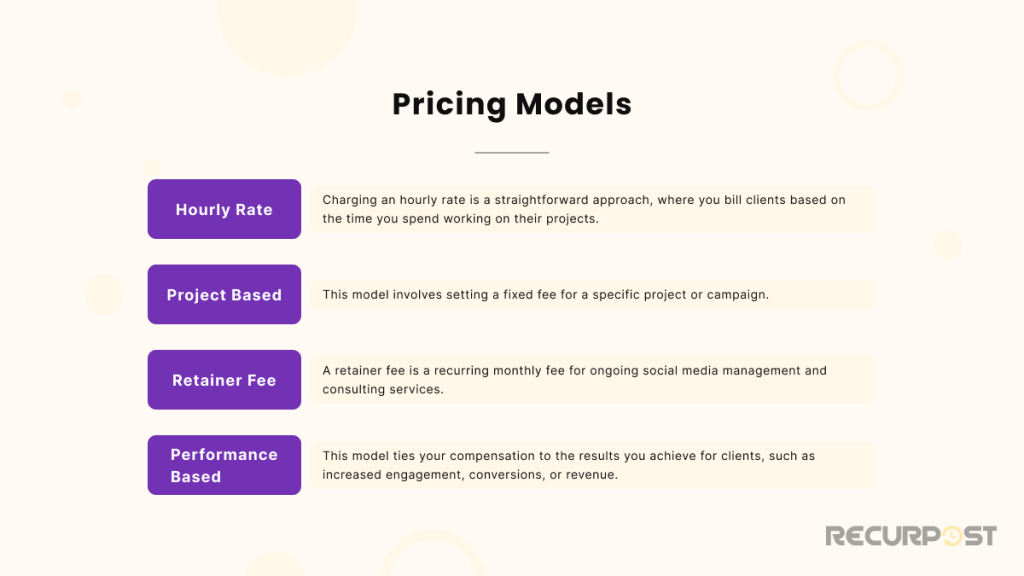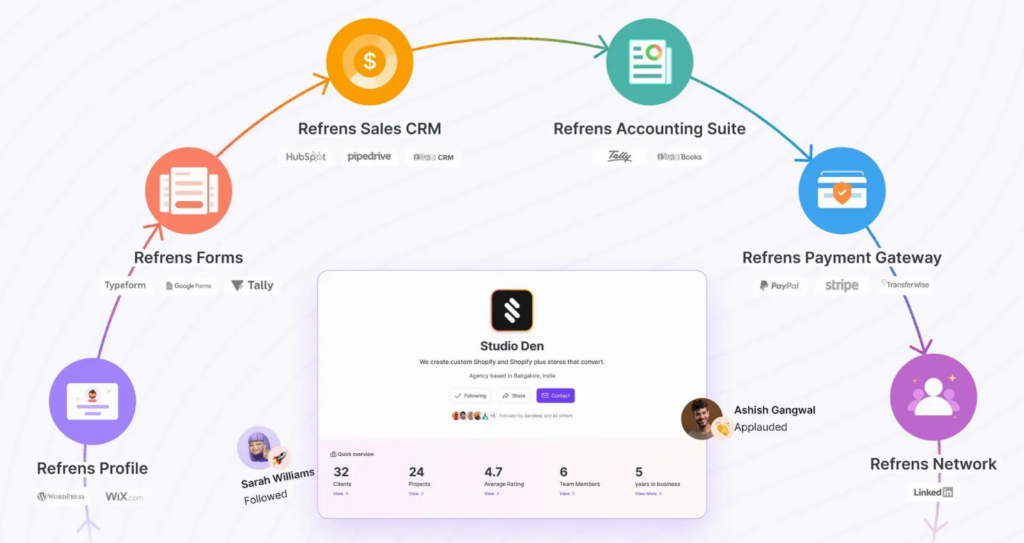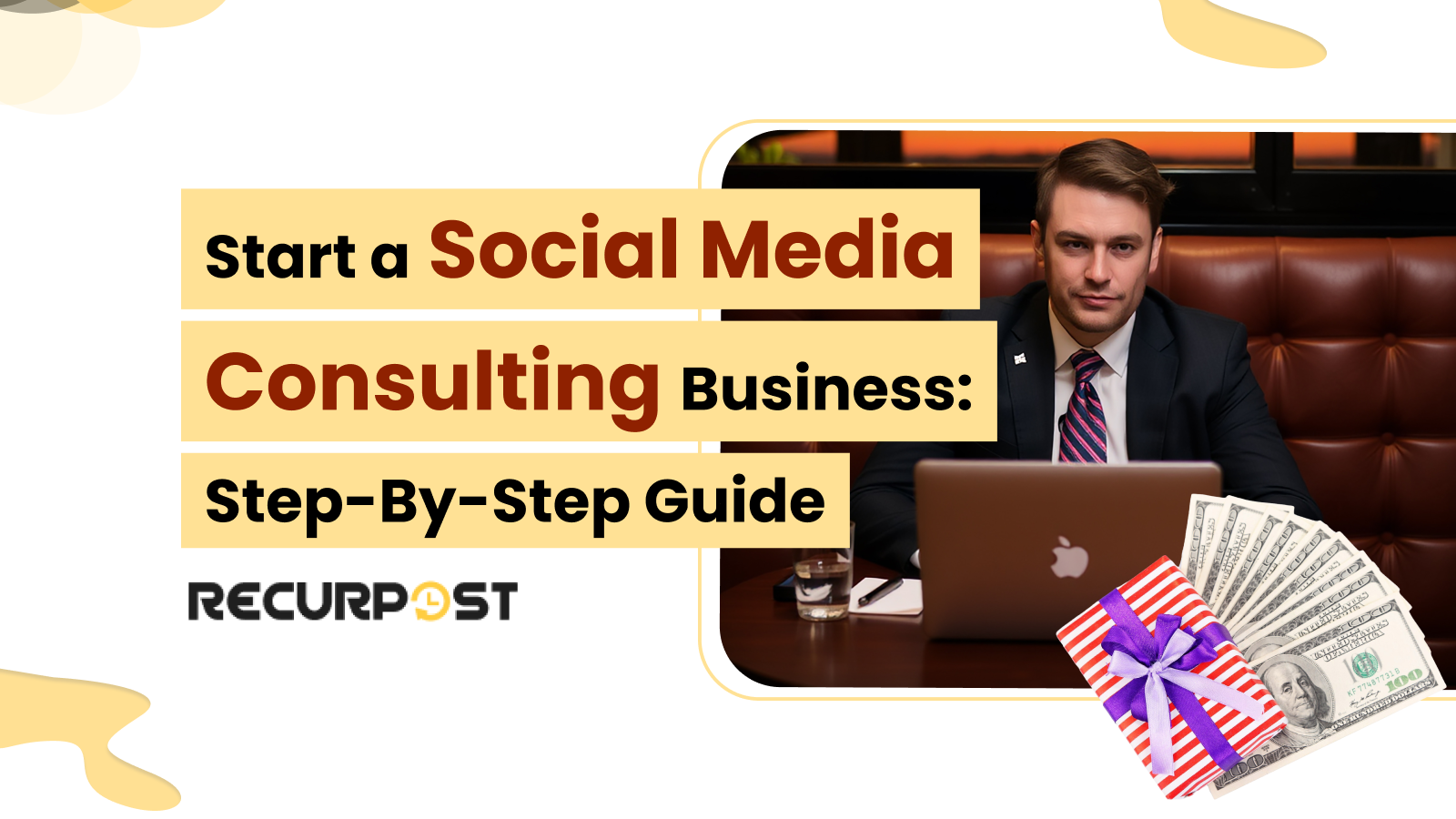Turn Social Media into a Money-Making Machine! Social media consultants help businesses go beyond online presence by creating strategies that drive engagement, build trust, and convert followers into customers. Through high-performing content, optimized ad campaigns, and trend leveraging, consultants ensure brands stand out in the digital space.
With proper expertise, social media transforms from a marketing tool into a revenue stream. Well-planned approaches maximize business reach, engagement, and profitability, creating new growth opportunities.
What is a Social Media Consultant?
A social media consultant is an individual or agency offering marketing or consulting services for businesses. Consultants typically work with multiple businesses simultaneously to improve their social media presence.
Types of Social Media Consultants
A social media management consultant helps businesses streamline online presence, ensuring consistent branding, engagement, and performance across platforms. Consultants specialize in different areas:
1. Platform-Specific Consultants
A digital social marketing consultant masters individual platforms like Instagram, LinkedIn, or TikTok, optimizing content and strategies for maximum impact.
2. Industry-Specific Consultants
A social media business consultant tailors strategies for niche markets, enabling businesses in healthcare, e-commerce, or finance to leverage social media effectively.
3. Strategy-Focused Consultants
A paid social consultant crafts data-driven strategies, maximizing brand ROI through targeted campaigns and conversion-focused planning.
4. Advertising Consultants
A social selling consultant turns social media into a sales powerhouse using ads, influencer collaborations, and direct selling techniques to drive revenue.
5. Content Creation Consultants
A social media consultant freelance crafts compelling videos, graphics, and copy to enhance engagement and brand storytelling.
How to Become a Social Media Consultant?
A social media consultant helps businesses grow through strategic planning, content optimization, and engagement across platforms. Success requires expertise, experience, and strong client relationships. Here’s how to get started:
1. Get Experience: Work on real projects through internships, freelancing, or managing your own brand to develop hands-on expertise in social media management and marketing.
2. Required Skills and Knowledge: Master content strategy, analytics, paid ads, and audience engagement while maintaining knowledge of platform algorithms and digital marketing trends.
3. Build Your Portfolio: Showcase your work with successful case studies, social media audits, and content samples to establish credibility as a freelance social media consultant.
4. Networking and Gaining Clients: Connect with businesses, attend industry events, and leverage LinkedIn and social media marketing groups to attract clients and grow your consultancy.
How to Start a Social Media Consulting Business
Launching a social media consulting business requires more than just marketing expertise—it demands careful planning and proper business setup. Follow these steps to establish a professional and legally compliant consulting practice:
1. Business Formation and Registration
Select a business structure that suits your needs, such as sole proprietorship, LLC, or corporation. Each structure offers different liability protection, tax implications, and operational flexibility. Register your business name through your local government office and obtain any necessary business licenses or permits required in your jurisdiction. Consider consulting with a business attorney or accountant to ensure proper setup.
2. Develop Your Service Offerings
Define clear service packages based on your expertise and market demand. Create detailed descriptions of what each service includes, expected deliverables, and pricing structure. Consider offering tiered packages to accommodate different client budgets and needs. Document your service delivery processes to ensure consistent quality and efficient operations.
3. Create Essential Business Documents
Develop professional contracts that outline scope of work, payment terms, deliverables, and policies. Create proposal templates that can be customized for potential clients. Design onboarding materials to streamline the process of bringing on new clients. Having these documents prepared in advance demonstrates professionalism and protects your business interests.
4. Set Up Financial Systems
Open a separate business bank account to keep personal and business finances distinct. Establish a bookkeeping system to track income, expenses, and tax obligations. Research and select appropriate accounting software that meets your business needs. Consider working with an accountant familiar with consulting businesses to ensure proper financial management.
5. Create Your Online Presence
Build a professional website showcasing your services, expertise, and results. Establish profiles on relevant social media platforms to demonstrate your capabilities. Develop a portfolio featuring case studies and client success stories. Your online presence serves as both a marketing tool and proof of your social media expertise.
6. Develop a Marketing Strategy
Create a marketing plan targeting your ideal clients through channels where they’re most active. Implement lead generation tactics such as content marketing, networking, and referral programs. Consider offering free resources or consultations to attract potential clients. Apply your social media expertise to your own marketing efforts to showcase your capabilities.
7. Establish Operational Systems
Set up project management tools to track client work and deadlines. Create templates for common tasks to improve efficiency. Develop communication protocols for client interactions. Efficient systems allow you to focus on delivering value rather than administrative tasks.
8. Secure Your First Clients
Leverage your existing network for initial clients and testimonials. Offer introductory rates or packages to build your portfolio. Provide exceptional service to generate referrals and positive reviews. Your first clients lay the foundation for your reputation and future growth.
What Does a Social Media Consultant do?
A social media consultant helps businesses navigate the changing digital landscape. Social platforms drive brand awareness, engagement, and sales, requiring professionals who know algorithms, audience behavior, and content strategy.
These are the roles of a social consultant
1. Building a Strong Digital Identity
Consultants help businesses establish powerful personal brands and online presence by optimizing social media profiles, maintaining consistent content style, and aligning messaging with business goals to attract the right audience.
2. Expert Social Media Consulting Services
A consultant provides essential services, including:
- Social Media Strategy: Developing tailored plans to increase brand awareness and audience engagement. Social
- Media Content: Crafting compelling posts, videos, and visuals that resonate with followers. Community
- Management: Engaging with audiences, responding to messages, and fostering relationships.
- Reporting and Analysis: Tracking performance metrics and optimizing strategies based on insights.
3. Market Analysis

Identifying target audience and niche markets
Knowing who your ideal clients are and what industries or sectors you specialize in will help you tailor your services and marketing efforts for your social media consultant company accordingly. Research and analyze your target audience’s demographics, pain points, and social media behaviors.
This knowledge enables crafting targeted messaging that resonates with client needs, positioning you as the solution to their social media challenges. Focusing on specific niches differentiates you from competitors, making you a sought-after consultant in specialized areas.
Networking and referrals
Referral networking leverages existing connections to create new opportunities and outreach channels.
Referral networking becomes a game-changer with a widespread, active social network, generating high-quality leads, reducing costs, building trust, and enabling hassle-free communication. Creating a structured strategy maximizes these networking benefits.
4. Converting viewers to consumers

Offering free initial consultations
Free initial consultations give customers temporary access to paid services. Thoughtfully offering free social media consultations attracts high traffic and potential customers.
Short-term free social media consultations impact potential customers more effectively than feature listings under purchase models. Customers experience time and energy savings firsthand, eliminating the need to emphasize service advantages.
Crafting compelling proposals and pitches
Winning clients requires crafting compelling proposals and pitches. Your proposals should clearly communicate the value you will bring to their social media efforts and demonstrate your understanding of their business goals.
Tailor proposals to client-specific needs, showcasing expertise in areas like Social Media For Education while highlighting how you deliver tangible results. Include case studies of successful campaigns executed for similar clients.
Use data and metrics to showcase your track record of driving engagement, conversions, and revenue. Well-crafted proposals capture client attention and differentiate you from competing consultants.
Delivering successful social media campaigns
After securing clients, deliver successful social media campaigns exceeding expectations by developing comprehensive strategies aligned with their goals and target audience.
Implement content creation and curation strategies resonating with audiences and reflecting brand identity. Leverage social media platform knowledge, analytics, agency tools, and industry trends to optimize distribution and engagement.
Building long-term client relationships and fostering loyalty
Maintain open communication with clients while ensuring objectives and priorities are met. Proactively provide strategic recommendations and identify growth opportunities. Serve as a reliable resource offering support, insights, and guidance beyond the initial engagement scope.
Deliver exceptional customer service through responsiveness, attentiveness, and adaptability to evolving needs. Exceed expectations by consistently delivering quality work that demonstrates commitment to client success.
5. Strategizing
Content Marketing strategies

Content marketing showcases expertise as an SMM consultant through valuable, educational content resonating with target audiences.
Consistency drives content marketing success. Publish valuable, relevant content aligned with your personal brand regularly. Use content calendars and social media bulk scheduling to maintain steady information flow for your audience.
You can also use automotive marketing tools and strategies to save more time, energy and money.
Monetization strategies

Consider additional revenue streams aligning with your expertise to complement consulting services. Potential monetization strategies include:
- Affiliate Marketing: Partnering with relevant brands and promoting their products or services through affiliate links can earn you commissions for successful referrals.
- Digital Product Creation: Develop and sell digital products such as e-books, online courses, templates, or resource guides tailored to your clients’ needs.
- Speaking Engagements and Workshops: Leverage your expertise by offering speaking engagements at conferences or hosting workshops to share your knowledge and generate income through event fees or sponsorships.
- Sponsored Content and Brand Collaborations: As your brand grows, explore collaborations with brands looking to reach your audience. Sponsored content or brand partnerships can provide an additional revenue stream.
Brand Strategies

Develop a strong personal brand by showcasing expertise through blog posts, videos, or podcasts. Provide valuable insights, tips, and industry updates demonstrating knowledge and establishing credibility.
Build online presence through social media platforms by sharing valuable content, participating in industry discussions, and connecting with influencers and potential clients.
Obtain certifications validating expertise and differentiating you from other consultants. Reputable organization certifications provide credibility and instill client confidence.
Pricing

Above are the four types of pricing models; Hourly rate, project-based, Retainer fee, and Performance-base,d that we’ve covered in this section as follows:
Crafting your price structures
For pricing your social media consulting services, determining their value is crucial. Evaluate factors such as your expertise, experience, the results you can deliver, and the unique value you bring to the table. Assess the market rates for similar social media consultant services first, but also be confident in charging what you’re worth.
As a freelance social media consultant, clients invest in your knowledge and skills to achieve business objectives. Clearly articulate the value clients receive and how your work positively impacts their bottom line.
Best resources: How to Grow a Social Media Marketing Agency
Different pricing models
Various pricing models for structuring social media consultant company fees include:
Hourly Rate: Bill clients based on time spent working on projects. This straightforward approach provides transparency but may limit earning potential.
Project-Based Pricing: Set fixed fees for specific projects or campaigns, capturing full expertise value and incentivizing efficiency. Manage scope creep and unexpected challenges carefully.
Retainer Fee: Recurring monthly fee for ongoing social media management and consulting services providing stable income and establishing long-term relationships. Define work scope accurately and ensure fair compensation.
Performance-Based Pricing: Compensation tied to client results like increased engagement, conversions, or revenue. Rewarding when delivering exceptional outcomes, but requires clear metrics and expectations.
Structuring fees as a social media consultant company requires evaluating different pricing models. Each model—hourly rate, project-based, retainer fee, or performance-based—offers distinct advantages and disadvantages.
To gain deeper insights into effectively pricing your agency’s social media marketing services and choosing the right model for your own business too, explore our comprehensive guide on How to Price Your Agency’s Social Media Marketing Services.
Check Out This Article Also: Social Media Marketing Provider Prices
Negotiating and upselling to increase revenue
When discussing fees with potential clients, confidently present your value proposition and highlight benefits gained from your services. Understand budget constraints while negotiating based on value delivered.
After establishing client relationships, identify opportunities to upsell additional services or projects. Pinpoint areas for further social media support and propose value-added solutions.
6. Business Models for Social Media Consultants
Solo Consultant Model
The solo consultant model involves operating as an independent professional who provides specialized social media expertise to multiple clients. This model offers flexibility, low overhead costs, and direct client relationships. Solo consultants handle all aspects of service delivery themselves, from strategy development to implementation and reporting. This model works well for consultants with strong time management skills who prefer maintaining complete control over client work and business operations.
Agency Model
The agency model involves building a team of specialists who handle different aspects of social media marketing. This structure allows consultants to scale by taking on more clients and offering comprehensive services. In this model, the consultant transitions from practitioner to business owner, focusing on business development while team members execute client work. The agency model requires investment in staff, systems, and processes but enables handling larger clients and projects.
Productized Service Model
The productized service model transforms consulting offerings into standardized packages with defined deliverables, timelines, and pricing. This approach streamlines operations, creates predictable income, and reduces the time spent on custom proposals. Consultants can create tiered service packages (basic, standard, premium) that address different client needs and budgets. This model works particularly well for consultants who have identified repeatable processes that consistently deliver results.
Hybrid Consulting Model
Many successful social media consultants adopt a hybrid approach, combining elements of different business models. For example, offering a mix of one-on-one consulting, productized services, and digital products. This diversification creates multiple revenue streams and allows consultants to serve clients at different price points. The hybrid model provides stability through recurring revenue while maintaining opportunities for high-value custom projects.
Choosing the Right Model for Your Business
When selecting a business model for your social media consultancy, consider your strengths, goals, and lifestyle preferences. Evaluate factors such as your desired income level, work schedule flexibility, growth ambitions, and the types of clients you want to serve. The right model aligns with your expertise and business vision while creating sustainable growth opportunities. Many consultants evolve their business model as they gain experience and market recognition.
7. Management

Legal Management: Managing contracts, agreements, and legal considerations
As a social media consultant, it’s important to manage contracts, agreements, and legal considerations to protect both yourself and your clients. Establish clear contractual agreements that outline the scope of work, timelines, deliverables, and payment terms for multiple clients.
Consult legal professionals to create comprehensive contracts protecting your interests. Familiarize yourself with data privacy and advertising regulations to maintain compliance.
Document client agreements and maintain open communication to build strong working relationships and prevent potential conflicts.
Refrens is one such platform that you can use for this purpose. By using Refrens, you can create customized contracts that outline the scope of work, timelines, deliverables, and payment terms. The platform provides templates that can be tailored to specific project requirements, ensuring clarity and protection for both parties.

Financial Management: Tracking finances and ensuring profitability
Implement systems tracking income, expenses, and financial performance. Use accounting software to maintain accurate records and monitor cash flow.
Understanding revenue sources, identifying high expenditure areas, and making informed financial decisions requires regular financial statement analysis. Assess profitability and improvement opportunities by considering client acquisition costs, project profitability, and ROI for additional services or tools.
Organizational Structure for Social Media Consultancies
As your social media consulting business grows, you’ll move from working solo to managing a team. A clear organizational structure is key to scaling while maintaining quality.
A typical setup includes strategists who create client plans, content creators who develop materials, account managers who handle client communication, and analysts who track performance. This lets each team member focus on their strengths and ensures clients get full-service support.
When growing, decide between hiring in-house or working with contractors. In-house teams offer control and consistency but cost more. Contractors bring flexibility and niche skills. Many firms use a hybrid model—keeping a core team and hiring specialists when needed.
To stay organized, set up clear communication, use project management tools, and document procedures. Hold regular meetings and performance reviews to keep the team aligned with your goals.
8. Personal Branding
Establishing credibility and thought leadership
Establish credibility by showcasing expertise through insightful blog posts, industry publication contributions, speaking engagements, and webinars. Offer valuable tips, practical advice, and unique perspectives demonstrating deep social media strategy understanding.
Position yourself as a thought leader by staying informed about industry developments. Track new platforms, algorithm changes, and emerging trends, sharing insights through social media, videos, or podcasts.
An inspiring example of this is Ian Anderson Gray. He actively showcases his knowledge and insights through various channels, including his blog, guest contributions to industry publications, and speaking engagements at conferences and webinars.

Building a strong network and collaborating with influencers
Connect with industry influencers, fellow consultants, and complementary professionals by attending conferences, joining online communities, and participating in networking events. Engage in conversations, offer support, and establish mutually beneficial relationships.
Collaborate on projects, share insights, and leverage networks to expand reach. Partner with niche influencers to enhance credibility and visibility through joint ventures, co-created content, or co-hosted webinars.
9. Industry Insights

Effective techniques for achieving financial success
Financial success in social media consulting requires specialization in particular industries or niches. Becoming an expert in specific fields positions you as the go-to consultant, enabling higher fees and attracting high-quality clients.
Building long-term client partnerships through exceptional results and exceeded expectations secures recurring contracts or retainers, creating stable income streams.
Diversify service offerings with high-value options like social media strategy development, training workshops, and consulting packages including ongoing support and guidance.
Leveraging networking opportunities and industry events
Networking is crucial to the success of a social media consultant. Attending industry events, conferences, and networking opportunities allows you to connect with fellow professionals, potential clients, and industry leaders.
Use networking events to build relationships, exchange insights, and collaborate with other social media consultants or complementary service providers. Engage in conversations, listen attentively, and offer expertise when relevant.
Join professional associations and online communities to network with like-minded professionals, share experiences, and learn from peers. These communities provide resources, job opportunities, and industry updates.
Leveraging social media platforms for self-promotion
Social media consultants must leverage platforms for self-promotion as a natural extension of their expertise. Use LinkedIn, Twitter, Instagram, or YouTube to amplify your brand and reach wider audiences.
Share success stories and case studies illustrating client results. Highlight unique approaches, strategies, and social media performance impacts. This social proof reinforces credibility and attracts potential clients seeking similar results.
Conclusion
Social media consultants craft high-level strategies driving engagement and revenue beyond daily management. While social media marketing experts focus on content and interactions, consultants optimize platforms, analyze trends, and maximize ROI.
Success stems from expertise, networking, and continuous learning. Strong portfolios and specialized services enable consultants to transform social media into income streams while helping businesses grow and scale.
Frequently Asked Questions
1. How to start a social media consulting business?
Becoming a social media business consultant requires hands-on experience, platform strategy mastery, and portfolio building. Define your niche, create service-based pricing, and market through networking, content marketing, and online communities.
2. How to make money as a consultant?
Paid social consultants earn through social media strategy, ad management, content creation, and analytics services. Monetize expertise through consulting packages, online courses, or retainer-based contracts with businesses requiring long-term support.
3. How to get clients as a social media consultant?
Attract clients by showcasing results through case studies, leveraging LinkedIn and social media groups, and business networking. Cold outreach, referrals, and guest blogging position you as an industry expert.
4. How can I improve my social media consulting skills?
Stay updated with platform changes, take digital marketing courses, experiment with trends, and analyze successful campaigns. Continuous learning and strategy testing refines expertise.
5. What qualifications do you need for social media consulting?
Expertise in content marketing, analytics, advertising, and social media management supersedes degree requirements. Certifications from Meta, Google, or HubSpot boost credibility and attract clients..

Dr. Dinesh Agarwal, founder of RecurPost, transformed from academic researcher to social media technology innovator in 2013. With a doctorate in Cloud Computing, he applied scientific principles to develop a pioneering social media management tool that streamlined content scheduling processes for digital marketers, leading to its successful acquisition. Today, his RecurPost platform serves as an enterprise-grade social media automation solution helping over 100,000 businesses optimize their online presence. Dr. Agarwal actively contributes to the social media marketing ecosystem through educational content, including conference presentations, podcast interviews, and in-depth articles focusing on social media optimization techniques and algorithmic content distribution strategies.
